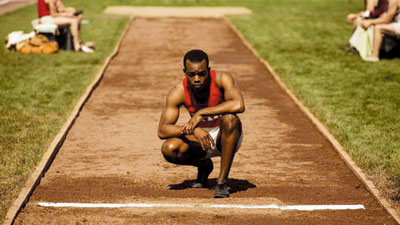 Directed by Stephen Hopkins, this is the second feature biopic* film about African American athlete Jesse Owens, who won four gold medals at the 1936 Summer Olympics in Berlin. The screenplay by Joe Schrapnel and Anna Waterhouse focuses on the three-year period leading to the 1936 Summer Games. The main storyline of the movie is the bond between Owens (Stephan James) and his Ohio State coach, Larry Snyder (Jason Sudeikis), who pushes him to go for the gold. Owens’ prowess* on the track was on a collision* course with matters of international policy, and the movie shifts between his adventures on the collegiate circuit and the debate within the U.S. Olympic Committee over whether Americans should boycott* an event hosted by a murderous regime*. William Hurt appears briefly as Judge Jeremiah Mahoney, who considers a boycott a matter of moral principle. Industrialist Avery Brundage (Jeremy Irons), on the other hand, insists that Depression-weary Americans are hungry for heroes. When, in the lead-up to his trip overseas, Owens is presented with a huge dilemma*, Hopkins stages the scene for all its symbolic weight: As the athlete is urged by a representative of the NAACP* to boycott the Games in an act of solidarity with the oppressed, the director surrounds him with his family, including his former sharecropper father — wonderfully played by Andrew Moodie in a nearly wordless performance that suggests a whole other movie, a look at the effects of segregation* and prejudice. James, who played John Lewis in “Selma,” signals the depths of Owens’ growing awareness — of the machinations* around him and of his own abilities and aspirations*. When he first enters the newly built stadium in Berlin, Rachel Portman’s strong score heightens the moment and Peter Levy’s cameras emphasize the size of the venue. But James’ look says everything necessary. And he brings an impressive, unforced physicality to the competition scenes, well captured by Levy.(SD-Agencies) | 
